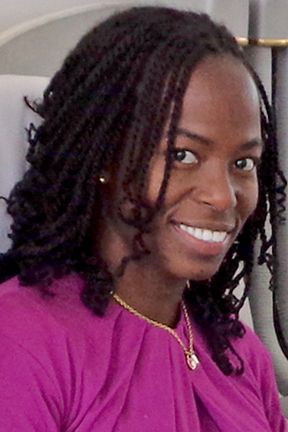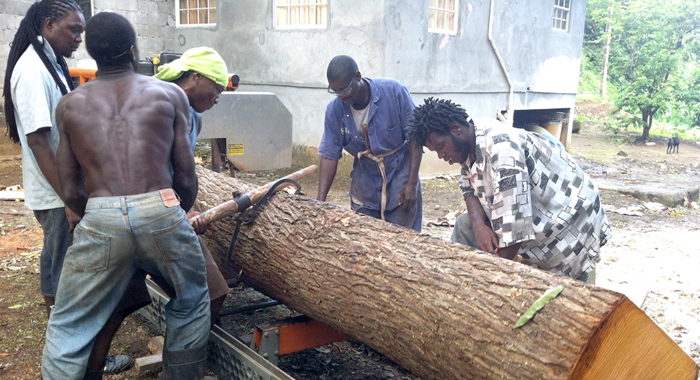(Editor’s note: This article was first published in the I-Witness News Independence e-magazine. The magazine can be downloaded here, free)

“You and I come by road or rail, but economists travel on infrastructure.”
That cheeky quote, attributed to the “Iron Lady”, late former prime minister of United Kingdom, Margaret Thatcher, shows the untoward attitude that some people, especially politicians, have towards economists.
Here’s another quote, attributed to George Bernard Shaw: “If all the economists were laid end to end, they’d never reach a conclusion.”
And, arguably, there is no set of economists that gets a more untoward reaction than those from the International Monetary Fund (IMF), where Vincentian economist Jehann Jack works.
Jack, who is originally from New Montrose, is based at the regional office of the IMF in Antigua and Barbuda.
Jack’s study of the production, consumption, and transfer of wealth — economics — did not result from a desire to become an economist, but because of a set of economic circumstances.
She had wanted to study law, but limited financial resources were a problem.
Think opportunity cost.
In the late 1990s, Jack was accepted at the University of the West Indies (UWI) Cave Hill Campus in Barbados on two consecutive years but did not have the funds to attend.
The following year, she decided to apply to the St. Augustine Campus in Trinidad also, she told I-Witness News Independence Magazine, noting that she factored into the equation the fact that, while Barbados has a currency that is higher than St. Vincent’s, Trinidad’s dollar was “more favourable”.
“It is funny because even though I had never studied economics, I think I always had that mind-set of saving,” said Jack who had worked at a department store and later at a pharmacy in Kingstown on Saturdays and during school vacation during her teenage years.
“When I was choosing what programme [to pursue], … I recognised that economics was the only course that did not ask for a [specific] subject. All it asked for was two A’ levels. So I said, ‘It has to be that economics is easy.’”
And so Jack, a Girls’ High School alumna who was in the arts stream then and later at A ‘Level, was on her way to becoming an economist.
She now holds a Master of Arts in economics, from Fordham University, a Master of Philosophy in development studies, from the University of Cambridge in the United Kingdom, and a Bachelor of Science in economics and management studies from UWI.
But despite the pessimism of the likes of Thatcher and Shaw, what is economics good for anyway?
“I think it is important because everybody has to face these questions about how to allocate resources. That is the main subject matter, the main objective of the study of economics,” Jack said.
She expounded saying that while people make these choices subconsciously, economists do so more explicitly, and, in her job, policy advice is mainly directed to governments.
Jack’s job includes monitoring, analyzing, and reporting to the IMF’s headquarters in Washington DC on economic, financial, political and social developments in the Eastern Caribbean Currency Union, of which St. Vincent and the Grenadines (SVG) is a member.
The Unity Labour Party government has made it clear that the nation is “not a colony of the IMF”.
Because of IMF policy, Jack is not directly responsible for analysing the Vincentian economy, although she maintains a keen eye on what is taking place here, in light of her ties to the country.
But when an IMF economist is analysing a country, do they factor into their consideration that country’s government’s view of the IMF?
“I would like to think so but I … tend to think that most countries have a love-hate relationship with the IMF,” she said, adding, “Maybe it is political expediency.”
The IMF sometimes prescribes large and bitter pills that can be particularly difficult for governments — who often have their eyes on the next elections — to swallow.
“… you know even if they themselves want to do it, my impression is that they tend to say that the IMF suggested that we do it,” Jack said of the unpopular decisions that governments are sometimes forced to take to preserve their countries’ economies.
And while the IMF can only advise on the course of action that should be taken, do IMF economists, consider how their proposed policies might affect, say, a van driver in Kingstown or a single parent in Chateaubelair?
“I think broadly, yes,” Jack said.
“Most of the time, especially now, most countries are going through the global economic crisis and even in the design of IMF programmes, I know for sure for Antigua, because I was involved from the beginning, there was the concern of maintaining government expenditure on social safety nets to protect the poor and vulnerable…” Jack said.
Whither SVG’s economy over the next decade?

Vincentian economist Jehann Jack in September her 10th year since becoming an economist.
Looking at the Vincentian economy through her “regional lens”, she said that we are “doing well”.
The debt relief that the ULP government secured for the Ottley Hall Marina Project, when it initially happened, saw SVG having the lowest debt-to-GDP ratio in the ECCU.
The debt has since inched back up to about 70 per cent — still among the lowest in the region, although the countries themselves have set a 2020 deadline for reaching a 60 per cent ratio, Jack observed.
“Some countries will not reach there. I think St. Vincent is one that should reach there and it should reach there ahead of time.”
However, once the loans for the EC$652 million Argyle international airport, which is under construction, are fully disbursed, the debt-to-GDP ratio will start to increase again, Jack said.
And, as far as skilfully sailing throughout the global economic crisis, Jack thinks that SVG “is probably, if it is not one of two, it is the one that basically fared the best among the ECCU economies.”
Antigua lost about 25 per cent of GDP over the period of the crisis. Anguilla in one year (2009) had a decline that was in the double digits, she said.
However, having fared well throughout the economic crisis, where should the Vincentian economy go over the next ten years?
While Jack said that the evolution of economic systems in most developed countries went from agricultural to manufacturing to services, she thinks that SVG can skip through manufacturing.
She said that with a manufacturing sector, economies of scale are important. She further noted that SVG has one of the highest electricity rates in the region — “and that is one of the impediments”.
Finance is also an impediment, Jack said, adding that there is an argument that the region has too many banks, and hence there is not enough pooling of resources that could see the granting of loans of the size that can help to finance manufacturing endeavours.
“Specific to St. Vincent, because the Government has embarked on the airport project, I would like that in 10 years time we are in a position to see the benefits of this project.
“There is always the fear that even though we have that infrastructure it may not necessarily — it may not immediately lead to increased arrivals.
“I think that would be really unfortunate if it were to happen, because, obviously, you are going to have to repay these loans and you have to maintain the facility. So I would like to see us have these wide-body aircraft coming in, tourism booming in the country.
“… I would hope that these are things that the Government is thinking about right now — deciding what is the mix we want to have. How many large hotels we want to have? Are we going to keep a lot of the boutique hotels?
“There are advantages and disadvantages to everything but because of the project, I would like to think that we would have to get into some type of mass tourism otherwise we would probably not need to get the airport,” she said.
In light of her view that SVG should skip over the manufacturing phase and head straight to services – which Jack said seems to be the case anyway –she is proposing emphasis on information communication technology, and getting people into thinking how they can change a situation, and add value.
“One of the things about entrepreneurship and ventures is usually you might have 10 ideas and even if nine fail, the one that succeeds would bring so much benefit that it is okay that nine failed. So, you just need to get this generation of ideas,” she said.
And regarding the question of agriculture or tourism, Jack said:
“It is important to look ahead and see where the opportunities lie, although it is sometimes difficult to see that.”
One of the difficulties in agriculture is that the price is not always guaranteed, she noted.
“If you are flexible and nimble enough to keep switching as the trends change, then fine. Otherwise, you kind of have to go with it. If you decide that agriculture is the thing, you will have to know that there are times when the price is going to drop and you are just going to have to deal with it,” she said.
She however noted that people do not like swings — where they are in a favourable economic situation one day and an untoward one another day.
“They prefer to maintain a standard,” she said.






Ms. Jack is cautious in her comments about the Argyle International Airport, and rightly so. All of us want the airport to succeed but some of us are understandably skeptical nonetheless. Why? The Ottley Marina, which she mentions, and the Sir James Mitchell airport in Bequia are two good examples. So are the examples of the international airports and international airlines around the world that have either failed or are revenue-sucking government owned enterprises at best. International tourism and the hotel industry are very risky enterprises (Ask Donald Trump). I fear that there is a better than even chance that the Argyle International Airport will turn out to be only another political victory for the ULP for the fourth time next year but tremendous failure for the economy and people of SVG in the short, medium, and long-run.